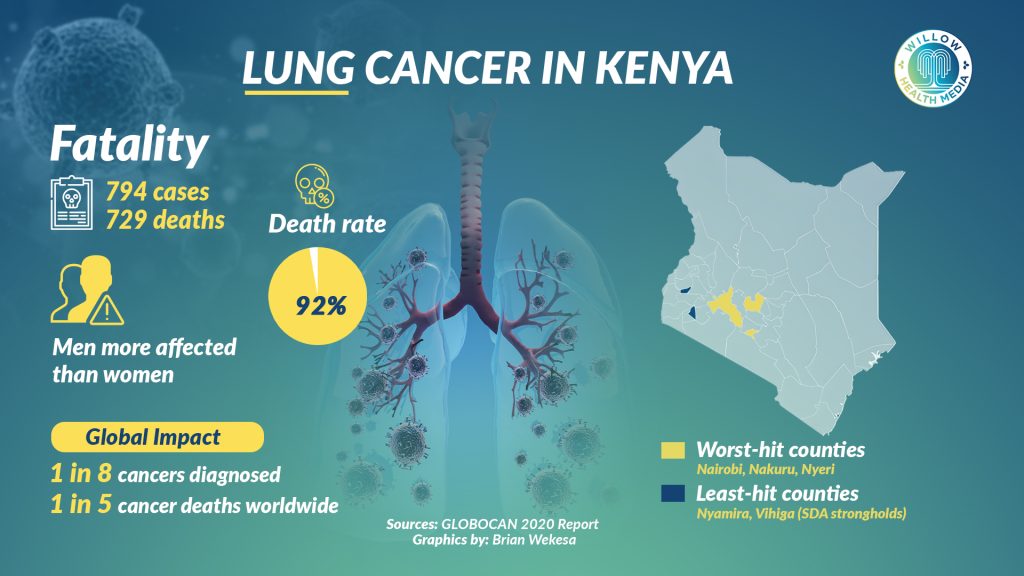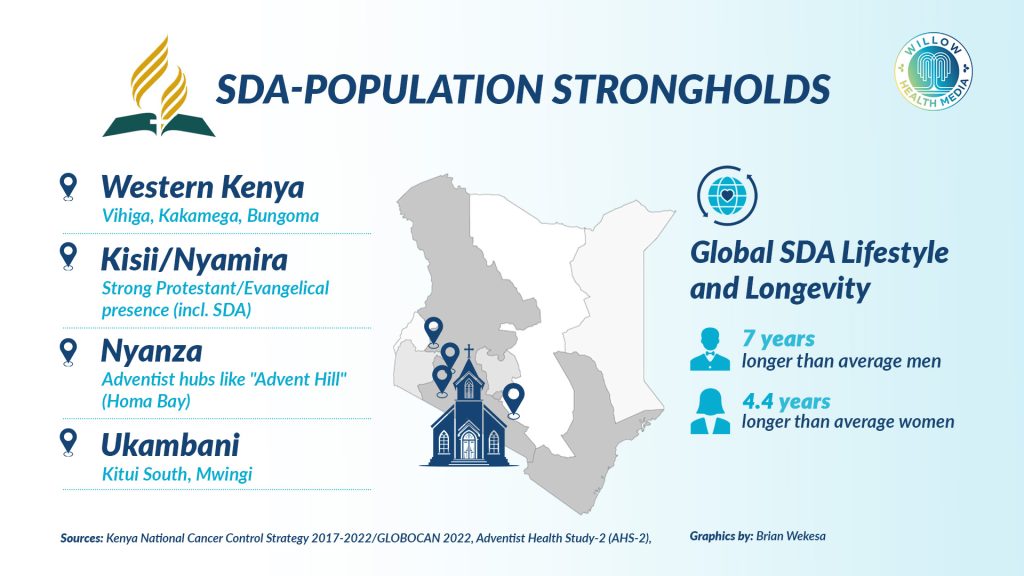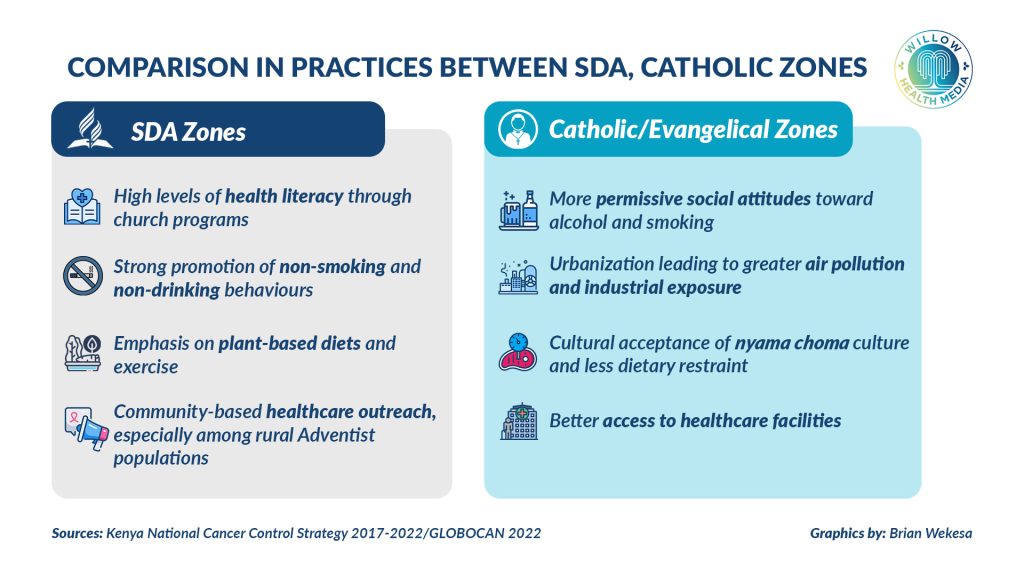“The SDA health message is not just about physical health; it’s a holistic approach. When the body, mind, and spirit are aligned, disease has less of a foothold” – Dr Daniel Macharia, Kenyan SDA health educator and physician.
Kenya is at a critical crossroads in its battle against lifestyle diseases. Non-communicable diseases (NCDs) like cancer, heart diseases and diabetes now account for over 33 per cent of all deaths, according to the Ministry of Health. Lung cancer is among the deadliest, often diagnosed late with poor outcomes and limited access to specialized care.
But while most efforts focus on treatment, could lifestyle prevent disease? Could faith-based habits—like those promoting clean living—lower risks in regions where the faith is dominant?

Lung cancer is primarily linked to smoking, air pollution, and occupational hazards, all of which are modifiable or preventable risks. Globally, over 70 per cent of lung cancer cases are attributed to tobacco use alone. This makes lung cancer a useful indicator when examining the impact of lifestyle choices on disease prevalence. In a country like Kenya, where urbanization, pollution, and tobacco marketing are on the rise, understanding protective factors is urgent.
The Seventh Day Adventist (SDA) Church promotes a unique health philosophy and set practices. These practices are not simply doctrinal; they are backed by epidemiological research. The Adventist Health Studies (AHS-2) in the United States have shown significantly lower rates of cancer, heart disease, and mortality among Adventist populations compared to national averages.
This begs the question: Does faith-based healthy living protect SDA faithful against lung cancer compared to other regions with more liberal lifestyle denominations like Roman Catholics? Well, by comparing religious communities and regional cancer rates, we explore if faith-driven habits make a difference.
Many Adventists follow a vegetarian diet rich in fruits, vegetables, whole grains and legumes
The SDA Church is among the few that emphasize health as a spiritual calling. For over a century, the Adventist lifestyle—which has helped reduce chronic disease risks—is built around several key principles including avoiding alcohol and cigarettes; not only as a health, but also as a spiritual and moral decision.
Many Adventists follow a vegetarian diet rich in fruits, vegetables, whole grains and legumes, avoiding meat and processed foods. Regular physical activities are embedded into daily life via walking, gardening and community bonding- which become emotional and social buffers against isolation and depression. For Adventists, observing Saturday as a holy day promotes rest, mental wellness, and stress relief.

This isn’t just talk—science backs it up. Indeed, the Adventist lifestyle is one of the most researched faith-based health models with landmark studies (AHS-1 and AHS-2) conducted by Loma Linda University in California tracking 96,000 Adventists in North America.
Adventists, the studies revealed, enjoy a 30–50 per cent lower risk of certain cancers (including lung, colorectal, and breast cancers), cardiovascular disease, diabetes, hypertension, and obesity compared to the general population.
They have an increased life expectancy, with Adventist men living an average of 7.3 years longer, and women 4.4 years longer, than the national average in the USA.
In fact, the World Health Organization (WHO) and National Geographic have cited SDA communities particularly Loma Linda, California as one of the world’s five official “Blue Zones” of exceptional longevity.
A balanced, plant-based diet, rest, and spiritual well-being creates a protective layer against modern lifestyle diseases
“The Adventist health message isn’t just about living longer it’s about living better. Our emphasis on a balanced, plant-based diet, rest, and spiritual well-being creates a protective layer against modern lifestyle diseases,” said Dr Zeno Charles-Marcel, Associate Director, Health Ministries, General Conference of Seventh-day Adventists.

This combination of doctrinal guidance and scientific validation has made the SDA lifestyle a credible model in public health circles, especially against lung cancer.
The SDA Church has notable roots in western Kenya, Kisii, Nyamira, Nyanza, and Ukambani regions-where abstinence from alcohol and tobacco might vary in line with SDA teachings.
Western Kenya, for instance, reports the highest alcohol consumption in the country at 26.4 per cent, with traditional brews like chang’aa having keen throats. Kisii and Nyamira have significant issues with illicit brews, with Kisii accounting for the highest seizures of Kangara brew.
The Western region has a male smoking prevalence of 11 per cent, which is lower compared to regions like Eastern (29 per cent) and Central (27 per cent). These statistics suggest that while SDA principles promote abstinence, regional cultural practices and economic factors influence actual consumption patterns.
Nairobi, Nakuru, Kiambu, Machakos, and Nyeri counties report the highest number of cancer cases
Lung cancer is a significant health concern in Kenya, with an estimated 1,200 new cases and over 800 deaths annually. Notably, over 60 per cent of those affected are below the age of 70, and 70–80 per cent are diagnosed at an advanced stage, underscoring the need for improved awareness and early detection efforts.
Data from the National Cancer Institute of Kenya indicates that Nairobi, Nakuru, Kiambu, Machakos, and Nyeri counties report the highest number of cancer cases. These regions are predominantly urban or peri-urban, with higher levels of industrial activity and pollution with smoking as a primary risk factor.

Kenya’s cancer landscape hints at a link between faith-based lifestyles and lower lung cancer rates—though not yet proven by research.
Lung cancer prevalence is also dependent on socio-economic and behavioural factors like access to healthcare. Urban Catholic zones, for instance, have more hospitals, but rural Adventist zones benefit from preventive health habits, lowering disease onset.
Another factor is health-seeking behaviour: SDA culture fosters early screening, health checks and avoidance of harmful behaviours, partly via church-driven education.
Money matters, too. Richer areas like Nairobi and Kiambu face more risks—junk food, smoking—while rural Adventist regions may dodge threats with simpler living.
While correlation does not prove causation, evidence suggests SDA strongholds—guided by faith-based health habits—show lower lung cancer rates. Meanwhile, urban and mixed regions, with looser lifestyles and more pollution, report higher cases.
Uasin Gishu County has high alcohol abuse, prevalent among Roman Catholic believers
In contrast to SDA emphasis on abstinence, many Catholic and Protestant communities in Kenya hardly frown at smoking, alcohol and meat consumption.
For starters, the Catholic Church hardly prohibit alcohol consumption, just drinking in moderation. In Catholic-majority regions like Uasin Gishu County, where studies have shown that alcohol abuse, particularly of traditional brews like busaa and chang’aa, is prevalent among Roman Catholic believers, with root causes including socioeconomic stress, peer influence, and the easy availability of illicit alcohol.

A 2023 study titled “Assessing Teachings of the Roman Catholic Church in Addressing the “Second Generation” Alcohol Abuse in Uasin Gishu County” found contradictions in church messaging, with some moderation allowances clashing with full abstinence principles, thus highlighting uncertainty in addressing illicit brews.
A similar 2022 study titled “The Challenge of Second-Generation Alcohol Abuse in Kenya” found that some Roman Catholic believers indulge in “second generation” alcohol such as busaa and chang’aa, with major factors including peer pressure, poverty, stress, media influence, and easy availability of illicit brews.
Further, the Catholic Church views smoking as morally acceptable in moderation but cautions against abuse. Paragraph 2290 of The Catechism of the Catholic Church advises against the abuse of tobacco, aligning with the virtue of temperance.
Catholic Church runs hospitals but prioritizes spiritual healing, which can delay medical care
It states that, “The virtue of temperance disposes us to avoid every kind of excess: the abuse of food, alcohol, tobacco, or medicine. Those incur grave guilt who, by drunkenness or a love of speed, endanger their own and others’ safety on the road, at sea, or in the air.”
On meat consumption, roasted meat (nyama choma) is part of cultural practice in predominantly Catholic regions in Central Kenya, where communal feasting stars meat and alcohol. These traditions foster community bonds, but can contribute to health issues like obesity, hypertension, and increased risk of cancer.
This dietary preference contrasts with the plant-based diet promoted by the SDA Church.

Kenya’s Catholic Church runs hospitals but prioritizes spiritual healing, which can delay medical care. The SDA Church, however, blends faith with health education, pushing prevention.
Data reveals a striking pattern: Kenya’s SDA communities—with their no-smoking, plant-based, active lifestyles—show lower lung cancer rates.
Science backs this: global Adventist studies prove such habits prevent disease.
While Kenya lacks long-term data, high-SDA counties like Nyamira, Vihiga and Kitui South consistently report lower lung cancer incidence.
Could faith-driven health be Kenya’s secret weapon against cancer? Religion isn’t a cure, but the SDA model—mixing discipline, community, and prevention—offers a blueprint worth trying out.





















